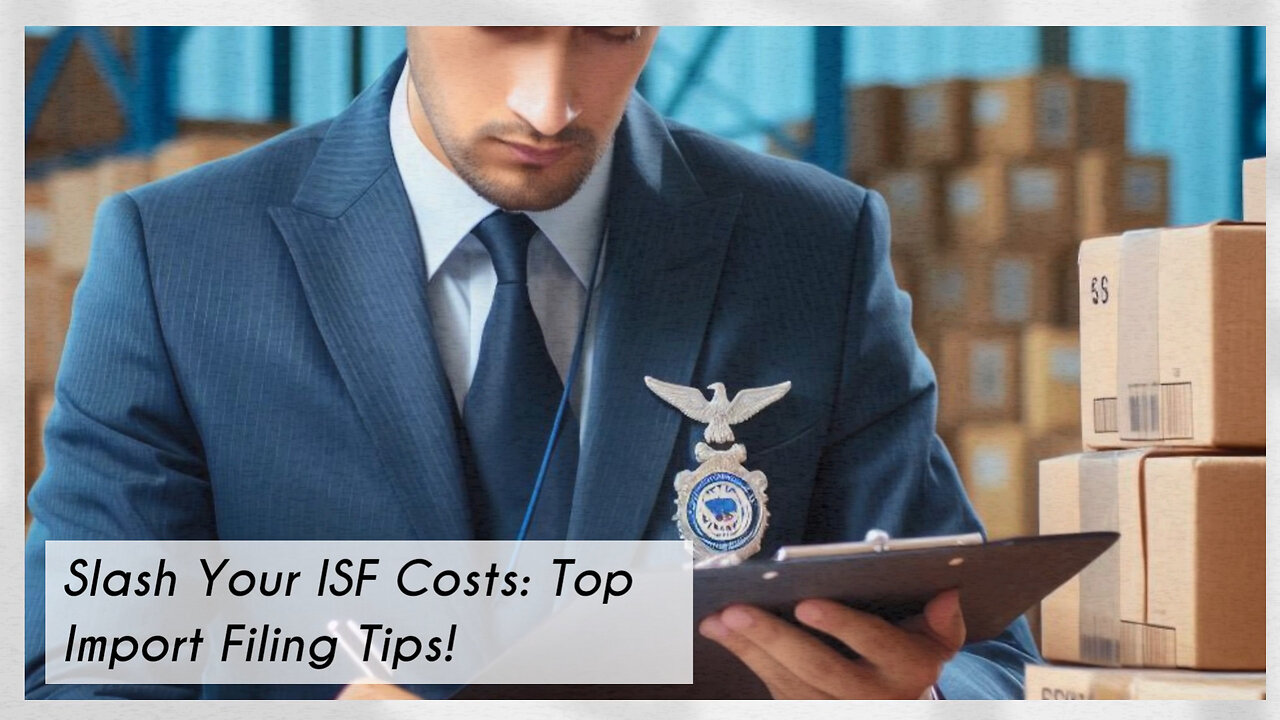Premium Only Content

Mastering ISF Compliance: Best Practices to Prevent Costly Oversights
ISF Checklist || 805-970-7918 || contact@isfchecklist.com || www.isfchecklist.com
This response provides valuable insights and best practices for importers to prevent costly oversights in Importer Security Filing (ISF). It emphasizes the importance of obtaining a customs bond and establishing a robust internal process. The use of technology, conducting a risk assessment, staying informed on regulations, and maintaining open communication with relevant parties are also discussed. By following these best practices, importers can ensure compliance, minimize the risk of oversights, and prevent delays and fines in the import process.
---
Importing goods involves a variety of regulations and requirements that importers must adhere to. One critical aspect of successful customs brokerage is obtaining a customs bond. A customs bond serves as a guarantee to the US Customs and Border Protection (CBP) that the importer will comply with all applicable laws and regulations. It is important to work with a reputable surety company to secure a proper customs bond, as this provides security in the event of any potential violations or financial loss to the government.
In addition to obtaining a customs bond, importers should establish a robust internal process to ensure that all necessary documentation is in order. This includes verifying the accuracy of the Importer Security Filing (ISF) before its submission. Mistakes or missing information in the ISF can lead to penalties and delays. To minimize the risk of oversights, importers can implement a checklist system and double-check all required data. This thorough approach enhances compliance and reduces the chances of costly errors.
The use of technology can greatly streamline the ISF filing process and enhance accuracy. Implementing automated systems and software tools designed specifically for customs brokerage can reduce the chances of human error and ensure efficient and timely filing. Additionally, these tools often provide real-time tracking and updates, allowing importers to stay informed about the status of their shipments. By utilizing technology, importers can enhance efficiency, reduce the risk of oversights, and improve overall operations.
Conducting a thorough risk assessment before initiating any import shipment is another critical best practice. By evaluating potential risks in terms of compliance, security, and trade requirements, importers can identify areas of concern and implement measures to mitigate those risks. This proactive approach ensures that the import process is carried out smoothly and minimizes the likelihood of oversights or non-compliance.
Staying informed and up-to-date on the ever-evolving regulations and requirements is crucial for importers. Customs regulations are subject to change, and it is essential to keep track of any updates that may impact ISF filings. Subscribing to industry newsletters, attending trade seminars, and actively engaging with customs experts can help importers stay ahead of the curve and prevent costly oversights. Being well-informed and proactive in understanding the regulatory landscape can significantly minimize the risk of errors and non-compliance.
Lastly, maintaining open communication with all relevant parties is key to ensuring a seamless import process. This includes regular communication with suppliers, freight forwarders, and customs brokers involved in the supply chain. By establishing clear lines of communication and providing timely and accurate information, importers can address any potential issues proactively and avoid costly delays. Effective communication facilitates efficient coordination among all parties involved, leading to a smoother import process.
In conclusion, preventing costly oversights in Importer Security Filing (ISF) requires importers to follow best practices such as obtaining a customs bond, establishing a robust internal process, utilizing technology, conducting a risk assessment, staying informed on regulations, and maintaining open communication. These practices contribute to compliance, minimize the risk of oversights, and ensure a smooth and efficient import process. By implementing these best practices, importers can prevent delays, fines, and other costly consequences, ultimately enhancing their overall customs brokerage operations.
#usimportbond #isfcustomsbroker #uscustomsclearing #isfentry
Video Disclaimer Here: This video is purely educational and has no ties with the US government.
0:38 - Critical requirement for importers to secure the international supply chain; non-compliance can lead to delays, fines, and cargo denial
1:00 - Essential for compliance with U.S. Customs and Border Protection (CBP); it guarantees adherence to regulations and protects against potential losses
1:43 - Implement a robust system to ensure all documentation is accurate and complete before submission; use checklists to minimize errors
-
 2:00:33
2:00:33
Joker Effect
4 hours agoSoo @MrBeast charity, is it legit? XenaTheWitch got attested? Lets talk about it! HOW TO GO VIRAL.
25.9K1 -
 27:01
27:01
TheRoyaltyAutoService
11 hours ago $2.81 earnedAnother Shop Replaced The Timing Belt & Fuel Injectors On This Honda Pilot… Now It Has No Power!
38.1K3 -
 10:14:25
10:14:25
GritsGG
13 hours agoRanked Crim 2! Most Wins 3390+ 🧠
71K1 -
 3:12:37
3:12:37
IsaiahLCarter
1 day ago $2.95 earnedJonah O. Wheeler: In Defense of Reality || APOSTATE RADIO #026
38.7K1 -
 LIVE
LIVE
Cewpins
7 hours agoSmoke Sesh🔥Gaming???💨420🍃!MJ !giveaway
126 watching -
 LIVE
LIVE
Phyxicx
6 hours agoShin Megami Tensei - Part 5 - 8/13/2025 | Chaos Route | Expert Difficulty
53 watching -
 1:59:32
1:59:32
vivafrei
16 hours agoEp. 277: Russia Peace Talks! Trump D.C. Takeover Leads to Lawsuit! Heat Wave Lawsuit? AND MORE!
88.8K122 -
 2:17:57
2:17:57
Nerdrotic
8 hours ago $4.97 earnedTransient Lunar Phenomenon: Deeper into the Mysteries of the Moon | Forbidden Frontier #112
29.2K6 -
 2:58:44
2:58:44
Barry Cunningham
1 day agoBREAKING NEWS: PRESIDENT TRUMP ABSOLUTELY TROLLS THE MEDIA! BIG WEEK AHEAD!
77K109 -
 1:37:28
1:37:28
Sarah Westall
8 hours agoReal Intel: Power Struggles Fueled by Blackmail, Surveillance & Coercion w/ Dr. Dave Janda
43.4K42